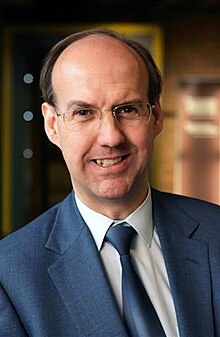
Nigel Linge FBCS FIET FHEA is Professor of Telecommunications at the University of Salford. He is a specialist in computer networking and telecommunications heritage.

Nigel Linge FBCS FIET FHEA is Professor of Telecommunications at the University of Salford. He is a specialist in computer networking and telecommunications heritage.
Linge was educated at Wolsingham Comprehensive School and then at the University of Salford where he obtained a degree in Electronics in 1983. He subsequently completed his PhD there in 1987 for a thesis on the subject of "The interconnection of local area networks using bridges". [1]
Linge is Professor of Telecommunications at the University of Salford. He is a specialist in computer networking and telecommunications heritage about which he has written two books with Andy Sutton. He is a Chartered Engineer and was elected Fellow of the Institution of Engineering and Technology, Fellow of the British Computer Society, and Fellow of the Higher Education Academy. [2] [3]

Stephen Byram Furber is a British computer scientist, mathematician and hardware engineer, and Emeritus ICL Professor of Computer Engineering in the Department of Computer Science at the University of Manchester, UK. After completing his education at the University of Cambridge, he spent the 1980s at Acorn Computers, where he was a principal designer of the BBC Micro and the ARM 32-bit RISC microprocessor. As of 2023, over 250 billion ARM chips have been manufactured, powering much of the world's mobile computing and embedded systems, everything from sensors to smartphones to servers.

Sir Andrew Hopper is a British-Polish computer technologist and entrepreneur. He is treasurer and vice-president of the Royal Society, Professor of Computer Technology, former Head of the University of Cambridge Department of Computer Science and Technology, an Honorary Fellow of Trinity Hall, Cambridge and Corpus Christi College, Cambridge.

Charles Eric Leiserson is a computer scientist and professor at Massachusetts Institute of Technology (M.I.T.). He specializes in the theory of parallel computing and distributed computing.
Peter Thomas Kirstein was a British computer scientist who played a role in the creation of the Internet. He made the first internetworking connection on the ARPANET in 1973, by providing a link to British academic networks, and was instrumental in defining and implementing TCP/IP alongside Vint Cerf and Bob Kahn.
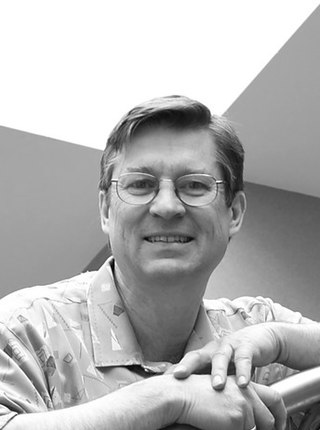
Andrew G. Barto is an American computer scientist, currently Professor Emeritus of computer science at University of Massachusetts Amherst. Barto is best known for his foundational contributions to the field of modern computational reinforcement learning.
Martin Oswald Hugh Carver, FSA, Hon FSA Scot, is Emeritus Professor of Archaeology at the University of York, England, director of the Sutton Hoo Research Project and a leading exponent of new methods in excavation and survey. He specialises in the archaeology of early Medieval Europe. He has an international reputation for his excavations at Sutton Hoo, on behalf of the British Museum and the Society of Antiquaries and at the Pictish monastery at Portmahomack Tarbat, Easter Ross, Scotland. He has undertaken archaeological research in England, Scotland, France, Italy and Algeria.
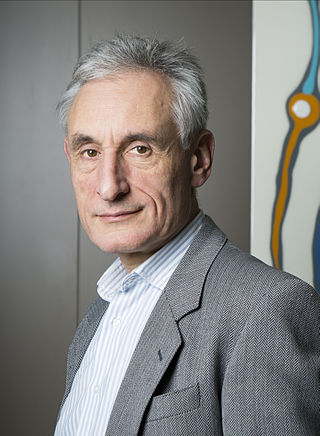
Andrew Blake FREng, FRS, is a British scientist, former laboratory director of Microsoft Research Cambridge and Microsoft Distinguished Scientist, former director of the Alan Turing Institute, Chair of the Samsung AI Centre in Cambridge, honorary professor at the University of Cambridge, Fellow of Clare Hall, Cambridge, and a leading researcher in computer vision.
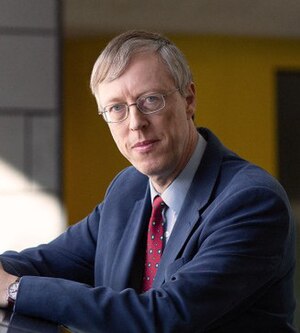
Nicholas John Higham FRS was a British numerical analyst. He was Royal Society Research Professor and Richardson Professor of Applied Mathematics in the Department of Mathematics at the University of Manchester.

Douglas Earl Comer is a professor of computer science at Purdue University, where he teaches courses on operating systems and computer networks. He has written numerous research papers and textbooks, and currently heads several networking research projects. He has been involved in TCP/IP and internetworking since the late 1970s, and is an internationally recognized authority. He designed and implemented X25NET and Cypress networks, and the Xinu operating system. He is director of the Internetworking Research Group at Purdue, editor of Software - Practice and Experience, and a former member of the Internet Architecture Board. Comer completed the original version of Xinu in 1979. Since then, Xinu has been expanded and ported to a wide variety of platforms, including: IBM PC, Macintosh, Digital Equipment Corporation VAX and DECstation 3100, Sun Microsystems Sun-2, Sun-3 and SPARCstations, and Intel Pentium. It has been used as the basis for many research projects. Furthermore, Xinu has been used as an embedded system in products by companies such as Motorola, Mitsubishi, Hewlett-Packard, and Lexmark.
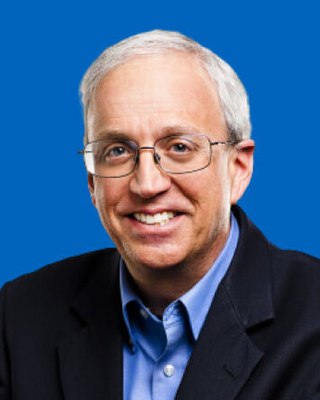
William James Dally is an American computer scientist and educator. He is the chief scientist and senior vice president at Nvidia and was previously a professor of Electrical Engineering and Computer Science at Stanford University and MIT. Since 2021, he has been a member of the President's Council of Advisors on Science and Technology (PCAST).
Connected Earth was a UK network of organizations, primarily museums, that preserve the history of telecommunications in the UK.
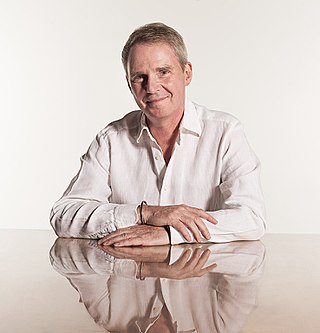
Sir Nigel Richard Shadbolt is Principal of Jesus College, Oxford, and Professorial Research Fellow in the Department of Computer Science, University of Oxford. He is chairman of the Open Data Institute which he co-founded with Tim Berners-Lee. He is also a visiting professor in the School of Electronics and Computer Science at the University of Southampton. Shadbolt is an interdisciplinary researcher, policy expert and commentator. His research focuses on understanding how intelligent behaviour is embodied and emerges in humans, machines and, most recently, on the Web, and has made contributions to the fields of Psychology, Cognitive science, Computational neuroscience, Artificial Intelligence (AI), Computer science and the emerging field of Web science.
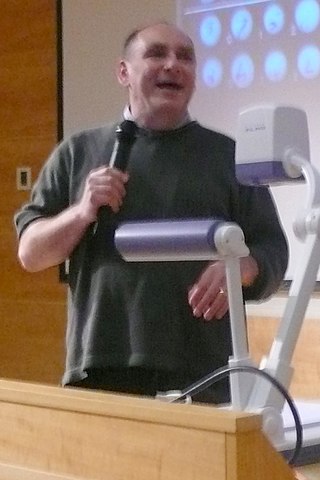
Jonathan Andrew Crowcroft is the Marconi Professor of Communications Systems in the Department of Computer Science and Technology, University of Cambridge, a Visiting Professor at the Department of Computing at Imperial College London, and the chair of the programme committee at the Alan Turing Institute.

Harold Vincent Poor FRS FREng is the Michael Henry Strater University Professor of Electrical Engineering at Princeton University, where he is also the Interim Dean of the School of Engineering and Applied Science. He is a specialist in wireless telecommunications, signal processing and information theory. He has received many honorary degrees and election to national academies. He was also President of IEEE Information Theory Society (1990). He is on the board of directors of the IEEE Foundation.

Wenfei Fan is a Chinese-British computer scientist and professor of web data management at the University of Edinburgh. His research investigates database theory and database systems.
Dharma P. Agrawal was a communications scientist who specialised in wireless sensor networks. Since 1998 he has been the Ohio Board of Regents Distinguished Professor of Electrical Engineering and Computing Systems at the University of Cincinnati. He has published work on wireless sensor networks and ad-hoc computing, and was one of the editors of the Encyclopedia on Ad Hoc and Ubiquitous Computing in 2009.
Sir John (James) O'Reilly DSc PhD CEng FREng, FRAes FLSW was Vice-Chancellor of Cranfield University from 2006 to 2013. He is the son of Patrick William and Dorothy Ann O’Reilly. He has one son and one daughter.
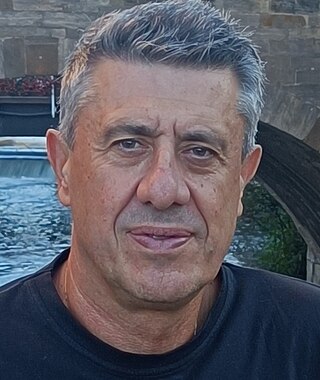
George K. Karagiannidis is a professor of electrical and computer engineering at the Department of Electrical and Computer Engineering of Aristotle University of Thessaloniki and a director of Digital Telecommunications Systems and Networks Laboratory. He was named Fellow of the Institute of Electrical and Electronics Engineers (IEEE) in 2014 "for contributions to the performance analysis of wireless communication systems".
Timothy M. Pinkston is an American computer engineer, researcher, educator and administrator whose work is focused in the area of computer architecture. He holds the George Pfleger Chair in Electrical and Computer Engineering and is a Professor of Electrical and Computer Engineering at University of Southern California (USC). He also serves in an administrative role as Vice Dean for Faculty Affairs at the USC Viterbi School of Engineering.